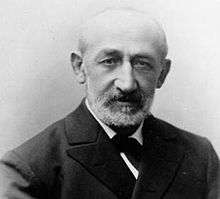Paul Gordan
| Paul Gordan | |
|---|---|
 Paul Gordan | |
| Born |
Paul Albert Gordan 27 April 1837 Breslau |
| Died |
21 December 1912 (aged 75) Erlangen |
| Nationality | German |
| Institutions | University of Erlangen-Nuremberg |
| Alma mater | University of Breslau |
| Academic advisors | Carl Gustav Jacob Jacobi |
| Doctoral students | Emmy Noether |
| Known for | Invariant theory, Gordan's lemma |
Paul Albert Gordan (27 April 1837 – 21 December 1912) was a German mathematician, a student of Carl Jacobi at the University of Königsberg before obtaining his Ph.D. at the University of Breslau (1862),[1] and a professor at the University of Erlangen-Nuremberg.
He was born in Breslau, Germany (now Wrocław, Poland), and died in Erlangen, Germany.
He was known as "the king of invariant theory".[2][3] His most famous result is that the ring of invariants of binary forms of fixed degree is finitely generated.[3] He and Alfred Clebsch gave their name to Clebsch–Gordan coefficients. Gordan also served as the thesis advisor for Emmy Noether.[1]
A famous quote attributed to Gordan about David Hilbert's proof of Hilbert's basis theorem, a result which vastly generalized his result on invariants, is "This is not mathematics; this is theology."[2][4] The proof in question was the (non-constructive) existence of a finite basis for invariants. It is not clear if Gordan really said this since the earliest reference to it is 25 years after the events and after his death, and nor is it clear whether the quote was intended as criticism, or praise, or a subtle joke. Gordan himself encouraged Hilbert and used Hilbert's results and methods, and the widespread story that he opposed Hilbert's work on invariant theory is a myth (though he did correctly point out in a referee's report that some of the reasoning in Hilbert's paper was incomplete).[5]
Publications
- Gordan, Paul (1885). Vorlesungen über Invariantentheorie. 1. Teubner. Retrieved 12 April 2014.
- Gordan, Paul (1887). Dr. Paul Gordan's Vorlesungen über Invariantentheorie. 2. B. G. Teubner. Retrieved 12 April 2014.
- Gordan, Paul (1987) [1885], Kerschensteiner, Georg, ed., Vorlesungen über Invariantentheorie (2nd ed.), New York: Chelsea Publishing Co. or American Mathematical Society, ISBN 978-0-8284-0328-3, MR 917266
Notes
- 1 2 O'Connor, John J.; Robertson, Edmund F., "Paul Gordan", MacTutor History of Mathematics archive, University of St Andrews..
- 1 2 Harm Derksen, Gregor Kemper. (2002), Derkson, Harm; Kemper, Gregor, eds., Computational Invariant Theory, Invariant theory and algebraic transformation groups, Springer-Verlag, p. 49, ISBN 3-540-43476-3, OCLC 49493513.
- 1 2 edited by A. N. Kolmogorov, A. P. Yushkevich ; translated from the Russian by A. Shenitzer, H. Grant and O. B. Sheinin. (2001), Kolmogorov, A. N.; Yushkevich, A. P., eds., Mathematics of the 19th Century: Mathematical Logic, Algebra, Number Theory, Probability Theory, Springer-Verlag, p. 85, ISBN 3-7643-6442-4, OCLC 174767718.
- ↑ Hermann Weyl, David Hilbert. 1862-1943, Obituary Notices of Fellows of the Royal Society (1944).
- ↑ Mclarty, Colin (2008), Theology and its discontents (PDF)
References
- Die Redaktion der Mathematische Annalen (1913), "Paul Gordan", Mathematische Annalen (in German), 73 (3): i–ii, doi:10.1007/BF01456698, ISSN 0025-5831, JFM 44.0023.06, MR 1511736, available at DigiZeitschirften.
- Noether, Max (1914), "Paul Gordan", Mathematische Annalen (in German), 75 (1): 1–41, doi:10.1007/BF01564521, available at DigiZeitschirften.